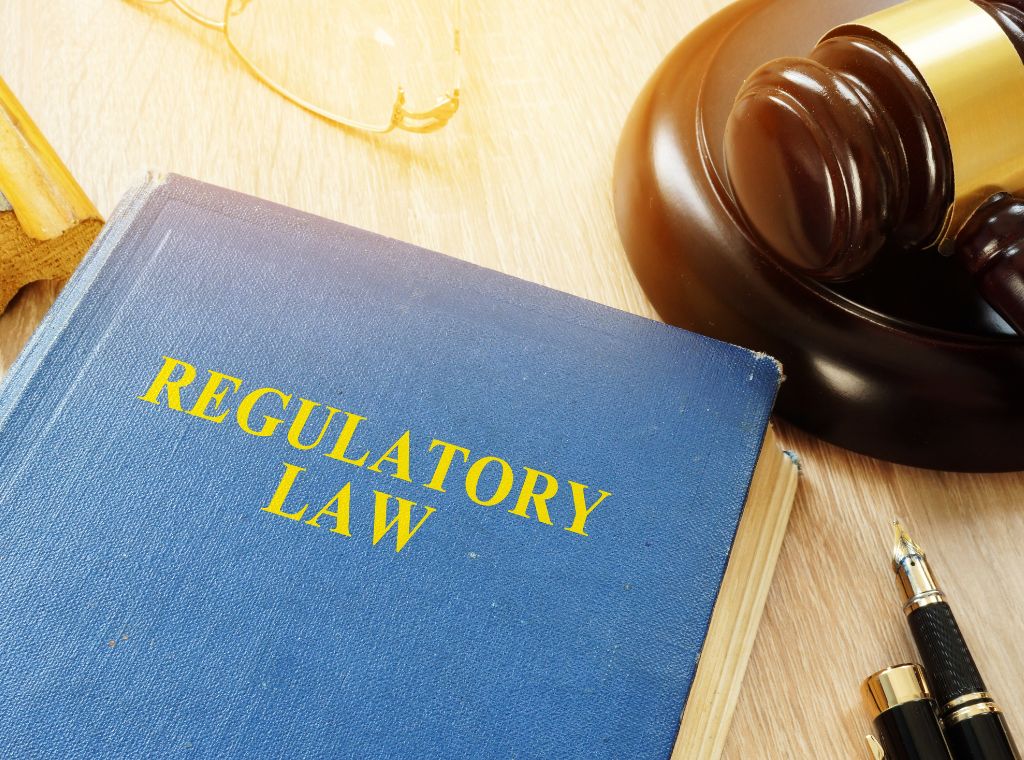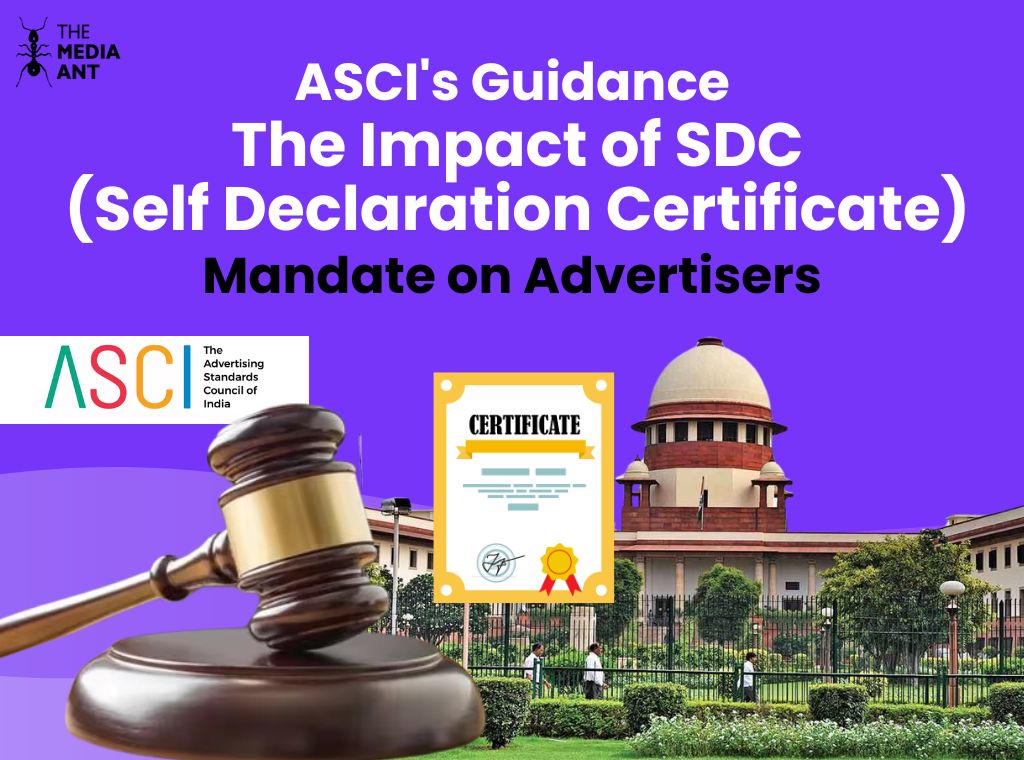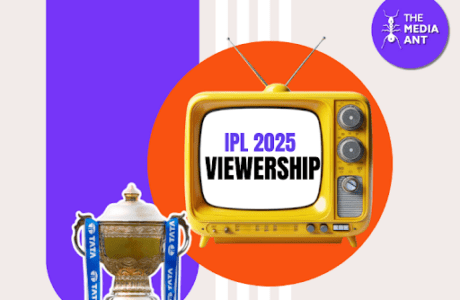A lot of debates dominating the Indian advertising industry speak of the SDC mandate – the mechanism that is poised to redefine the country’s advertising functioning. As this change is likely to happen within a short period, this might be considered as earth-shattering, but it is also essential to take what it holds as a significant change. The media and the advertising industries are on the horns of the hydraulic over the supreme court’s self declaration certificate in ads.
The rule which is SDC was passed on May 7 th 2024 Through this rule, Ministry of Information and Broadcasting (MIB) incorporated a new facility on the broadcast seva portal concerning the TV and radio advertisements and on the press council of India relating to the Print/ Digital/Internet Advertisements. It must be submitted through the above portals through an authorized representative of the advertiser/advertising agency who has to issue the certificate.
Impact on Advertisers and Broadcasters
This mark has been left by the Self Declaration Certificate (SDC) directive which was formulated by the supreme court of India to effectively eliminate and prevent misleading ads. In some of the past weeks the peculiar reactions of most stakeholders in the industry have implied that nobody knew whether and how the business of putting up advertisements would continue.
Thus, while print, radio or TV advertisers had a difficult, though manageable working to post the SDC for each ad, the given problem doubles for digital advertisers – notably for the D2C brands, who heavily rely on the user -generated content (UGC) as well as the influencer marketing ecosystem.
Digital native brands usually cannot manage it individually due to there being way too many of them, and their creatives are produced spontaneously, including all creatives that contribute to their creation. However, to ensure that these campaigns and creatives remain compliant in the future, Automation and API level integration are also required, as one of the experts suggested.
How do you think the new advertising regulations will affect the overall landscape of digital and traditional media advertising in the long run? Are there any potential benefits or drawbacks that advertisers should be aware of?

CaseStudy: Supreme Court of India, Patanjali Misleading Advertisements Case

The Supreme Court of India addressed the issue of misleading advertisements in a significant ruling against Patanjali Ayurved Limited. Initiated by the Indian Medical Association (IMA), the case exposed Patanjali’s unverified health claims in its advertising campaigns.
- The IMA filed a writ petition accusing Patanjali of false advertising concerning the treatment capabilities of its products for various diseases, a violation under specific advertising and consumer protection laws.
- Examination of compliance with the Drugs and Magic Remedies (Objectionable Advertisements) Act, 1954, and the Consumer Protection Act, among others.
- Patanjali’s ads were found to lack scientific support, misleading consumers into potentially abandoning proven medical treatments.
- The court criticized the high impact of celebrity endorsements in misleading advertisements and stressed their responsibility towards public health.
- Implementation of a ‘self-declaration certificate’ by advertisers and agencies to ensure adherence to the statutory provisions was mandated to uphold the fundamental right to health.
The Supreme Court’s decision underscores the urgent need for stricter compliance and oversight in advertising, particularly those involving health claims. This ruling aims to enhance the transparency and accountability of advertisers, especially when influential figures are involved, to protect consumer interests and uphold public health standards.
Legal Framework and Regulatory Mechanism

From a legal standpoint, the intent behind the SDC mandate is clear: to enhance accountability and reduce misleading advertisements. This directive requires advertisers to ensure their ads do not contain misleading claims and adhere strictly to regulatory guidelines before they can be aired or published.
Legally, this move is seen as a proactive step towards consumer protection. However, it introduces complexities, especially in the digital realm where ads are numerous and dynamic. The challenge lies in the practical implementation of such a broad and stringent regulation, which must balance legal objectives with operational feasibility.
Before the publication, printing, or broadcasting of any advertisements relating to products or services, it is crucial that advertisers and advertising agencies adhere to the obligations mandated under both general and sector-specific regulations:
Consumer Protection Act, 2019 and Associated Guidelines (2022):
The Consumer Protection Act, 2019, establishes a legal framework to safeguard consumers against unfair trade practices, including misleading advertisements. The Central Consumer Protection Authority (CCPA) is empowered under Section 21 to address issues related to misleading advertisements and can initiate actions and impose penalties as defined under the Act.
Additionally, the CCPA’s Guidelines for Prevention of Misleading Advertisements and Endorsements for Misleading Advertisements, 2022, set forth compliance requirements for all advertisement stakeholders. While these guidelines do not specify penalties for non-compliance, the CCPA can enforce penalties under the Act, which may include fines up to INR 50 lakh or imprisonment.
Cable Television Networks (Regulation) Act, 1995:
This Act prohibits the broadcasting of advertisements that are false, deceptive, or likely to mislead consumers regarding the nature, substance, quality, or quantity of goods or services. Rule 7 of the Cable Television Rules, 1994, further mandates that advertisements adhere to certain standards to ensure legality and respect for morality, decency, and religious susceptibilities of subscribers.
Drugs and Magic Remedies (Objectionable Advertisements) Act, 1954:
Aimed at curtailing misleading advertisements related to drugs and remedies with purported magical properties or false curative claims for specific diseases and disorders, this Act focuses on protecting consumers from deceptive marketing practices and ensuring that advertisement claims are scientifically substantiated.
ASCI’s Code for Self-Regulation of Advertising Content in India:
The Advertising Standards Council of India (ASCI) requires that advertisements be truthful and not misleading regarding any aspect of the goods or services, including performance and benefits. Advertisers and advertising agencies must ensure compliance with ASCI’s self-regulation guidelines when creating, publishing, or broadcasting advertisements.
ASCI’s Guidelines for Influencer Advertising in Digital Media:
Influencers are required to transparently disclose any material connections with the brands they promote. ASCI’s guidelines mandate that advertisements posted by influencers on digital media must include a clear and prominent disclosure label. Influencers must also ensure that the advertiser can substantiate the claims made in the advertisement to avoid misleading consumers.
MIB Releases New Guidelines: Self-Declaration Certificates Restricted to Food and Health Sectors
The Ministry of Information and Broadcasting MIB has published new and revised guidelines over the airing of ads, especially in the Food & Health segment. According to the new guidelines passed out in the recent past, it is obligatory on the part of these sectors to attest in writing an annual self-certification before the advertisements are to be aired or printed or displayed.
This action is under one program of increasing progressive clearheadedness in the ad trade, which was in reaction to the directions given by the Supreme Court of India. The new regulation replaces prior advisories, and in this new regulation, every advertiser or advertising agency that advertises items and services concerning food and health requires this certificate to be uploaded yearly.
The specifics of the requirement include uploading the self-declaration certificate to designated portals: The Broadcast Seva Portal for the advertisement meant for television and radio and the Press Council of India (PCI) portal for advertisement for prints and online. After that, the advertisers have to present evidence of the upload to all the related media buying platforms including the television networks, newspapers and/or the online publishing companies.
It found a ready endorsement with Manisha Kapoor, the CEO and Secretary General of the Advertising Standards Council of India (ASCI), who highlighted the utility of this new advisory. Many operational issues have been admitted by Kapoor in the context of the MIB as well as peculiarities of the functioning of the digital advertisement in the portals. She stressed that the SC has had specific concerns in the past regarding exaggerated advertisements particularly those that deal with the food and health industry.
These developments, identify a significant change in progressive enhancement of regulatory scrutiny of advertisement policies and processes in India and especially those that are sensitive to the health of the people and property. Hence the given goal of encouraging the consumers to put trust in the advertisements as much as the latter is credible.
Industry Reactions
Leading advertising agencies and law experts have expressed both support and concern over the new mandate. Krishnarao Buddha from Parle Products highlights the operational challenges, especially the timing: “The essence of digital advertising is speed. Delays in the SDC process could mean missing crucial marketing opportunities, diluting the impact of real-time campaigns.”
On the other hand, Janani Kandaswamy from ITC suggests a potential workaround: “By requiring a self-declaration for the campaign’s master theme rather than every individual creative, we could streamline compliance without sacrificing agility.”
With the Supreme Court’s recent mandate requiring a self-declaration certificate for all new advertisements post-June 18, 2024, how should advertisers prepare to adapt their campaign strategies to comply with these changes?

Timeline and Key Dates
The mandate has taken effect on June 18, a key date for all advertisers as they will need to ensure all new ads from this date onwards have an accompanying SDC. In the lead-up to this, advertisers and agencies are working feverishly to prepare and adjust their schedules.
Another critical date is July 9, when the Ministry of Information and Broadcasting is scheduled to submit an affidavit to the Supreme Court detailing the actions taken regarding the SDC mandate. This submission will also include feedback from stakeholders, which could influence further decisions on the mandate’s implementation.
The advertising and media industries are closely watching the dates for upcoming court hearings, which will be crucial in determining any modifications or continuations of the mandate. These hearings will likely address the numerous concerns raised by industry bodies and could lead to adjustments in the mandate’s scope or its operational requirements.
ASCI advertising advice service can support advertisers’ complaints with ASCI’s code ,which forms a key part of advertising code under the cable TV network Regulation Act. This would help advertisers be more confident of their self declarations which are now mandated for print, TV and Internet ads. Whether it is small or large advertisers, no ads would now be permitted on any media and channel without the certification.
Procedure to obtain the Self-Declaration Certificate for Advertisements
The Ministry of Information and Broadcasting (MIB) has established guidelines and outlined a specific procedure for the submission of self-declaration certificates for advertisements, which are crucial for regulatory compliance. Here is a summary of the process:
Execution of Self-Declaration Certificate: An authorized representative of the advertiser or advertising agency must complete a self-declaration certificate for any advertisements intended for television or radio broadcast. This certificate is a mandatory requirement that validates the content and intent of the advertisement.
Submission Portal:
Television and Radio Advertisements: The completed self-declaration certificate must be uploaded to the
Broadcast Seva Portal. This step is essential before any advertisements can be aired on TV or radio.
Print and Digital Media Advertisements: For advertisements intended for print or digital media, the certificate must be uploaded on the Press Council of India Portal.
Required Details for Submission:
- A clear and concise description of the product or service being advertised.
- The title of the advertisement.
- A detailed description of the advertisement’s content and format.
- The intended date for the first airing or publishing of the advertisement.
- Upload the respective URLs and/or PDF file of the actual advertisement.
- After submitting the required details and the self-declaration certificate, advertisers or advertising agencies must obtain and submit an acknowledgment receipt from the respective publisher or broadcaster. This receipt serves as a confirmation of compliance with the submission guidelines.
Adherence to these guidelines ensures that the advertisements meet regulatory standards and are appropriately vetted before broadcast or publication. In order to ensure compliance and maintain accurate records, advertisers are required to submit proof of uploading the self-declaration certificate for advertisements to the appropriate broadcaster, printer, or publisher.
Challenges and Operational Adjustments
Advertisers are grappling with the complexity of managing countless ads that need individual certificates. This not only makes the process cumbersome but potentially stifles creativity and innovation. As Chetan Asher, CEO of Tonic Worldwide, points out, “The current system’s rigidity could slow down the dynamic and iterative nature of digital campaigns, from social media to paid searches.”
Given the requirement for self-declaration certificates, what challenges do you anticipate in campaign planning and execution, and how can advertisers mitigate potential delays or disruptions?

Moreover, there’s a significant concern about the portal’s capacity to handle the volume of submissions without technical glitches, given the high frequency of ad releases in digital media. This complexity is doubled for direct-to-consumer (D2C) brands, which heavily rely on user-generated content and influencer marketing, making compliance a daunting task.
To navigate these challenges, advertising agencies are swiftly adjusting their operational strategies. Many have begun rescheduling their advertising campaigns to fit within the compliance timeline, advancing the release of new ads before the enforcement date. Furthermore, agencies are exploring the possibility of automating compliance processes through API integrations to manage the sheer volume of creatives more efficiently.





